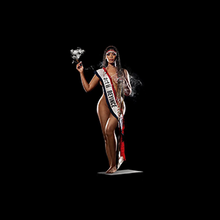
Back Cowboy Carter Azerbaijani Cowboy Carter German Cowboy Carter Greek Cowboy Carter Spanish کابوی کارتر Persian Cowboy Carter Finnish Cowboy Carter French Cowboy Carter HE Cowboy Carter Hungarian Cowboy Carter Icelandic
| Cowboy Carter | ||||
|---|---|---|---|---|
 Digital cover | ||||
| Studio album by | ||||
| Released | March 29, 2024 | |||
| Recorded | 2019–2024[1][2] | |||
| Studio |
| |||
| Genre | ||||
| Length | 78:21 | |||
| Language | English, Italian | |||
| Label | ||||
| Producer |
| |||
| Beyoncé chronology | ||||
| ||||
| Alternative cover | ||||
 Alternative cover on the limited edition vinyl and CDs. | ||||
| Singles from Cowboy Carter | ||||
| ||||
Cowboy Carter (also referred to as Act II: Cowboy Carter) is the eighth studio album by American singer and songwriter Beyoncé, released on March 29, 2024, via Parkwood Entertainment and Columbia Records. A concept album, Cowboy Carter is the second of a planned trilogy of albums, following Renaissance (2022). Beyoncé conceived Cowboy Carter as a journey through a reinvention of Americana, spotlighting the overlooked contributions of Black pioneers to American musical and cultural history.
Although many have labeled it a country album, Cowboy Carter blends diverse musical genres including pop, hip hop, trap, psychedelic funk, blues, soul, rock, rock and roll, opera, "Irish" jig, and folk music. Conceptually, the album is presented as a radio broadcast by a fictitious station called "KNTRY Radio Texas", with country singers Dolly Parton, Linda Martell, and Willie Nelson acting as disc jockeys. The album's songs feature lesser-known Black country artists such as Tanner Adell, Brittney Spencer, Tiera Kennedy, Reyna Roberts, Shaboozey, and Willie Jones. The music is driven by a range of acoustic instruments played by musicians including Stevie Wonder, Paul McCartney, Nile Rodgers, Jon Batiste, Gary Clark Jr., and Rhiannon Giddens.
Cowboy Carter was met with universal acclaim upon release; critics felt that the album's genre experimentation, expansive scope, and eclectic references aided an ambitious reimagining of Americana and country through the lens of their Black roots. The album ignited discussions on Black musicians' place within country music, boosted the listenership of Black country artists and country radio in general, and increased the popularity of Western wear and culture.
Cowboy Carter debuted at number one in several countries, including Australia, Canada, France, Germany, the Netherlands, and the United Kingdom, and broke several chart and streaming records. In the United States, Cowboy Carter became Beyoncé's eighth consecutive number-one album on the Billboard 200 and the first album by a black woman to top the Top Country Albums chart. Two co-lead singles — "Texas Hold 'Em" and "16 Carriages" — supported the album, with the former becoming Beyoncé's ninth number one single in the United States and the first country song by a Black woman to top the Billboard Hot 100 and Hot Country Songs charts. The Miley Cyrus-duet, "II Most Wanted", was released as the third single.
- ^ Price, Joe (March 22, 2024). ""16 Carriages" Producer Breaks Down the Difference Between Working on 'Renaissance' and 'Cowboy Carter'". Complex. Archived from the original on March 22, 2024. Retrieved March 23, 2024.
- ^ Cite error: The named reference
pitchfork1was invoked but never defined (see the help page). - ^ a b Williams, Yasmin (April 2, 2024). "Beyoncé's country album drowns out the Black music history it claims to celebrate". The Guardian. Archived from the original on April 4, 2024. Retrieved April 4, 2024.
- ^ Hodgkinson, Will (March 28, 2024). "Beyoncé: Cowboy Carter review — a slick and starry western epic". The Times. Archived from the original on March 28, 2024. Retrieved March 28, 2024.
- ^ Savage, Mark (March 28, 2024). "Beyoncé's Cowboy Carter: The verdict – is it Yeehaw or No Ma'am?". BBC. Archived from the original on April 4, 2024. Retrieved April 4, 2024.
- ^ Cite error: The named reference
Pitchforkwas invoked but never defined (see the help page). - ^ Cite error: The named reference
Slantwas invoked but never defined (see the help page). - ^ Cite error: The named reference
:63was invoked but never defined (see the help page).
© MMXXIII Rich X Search. We shall prevail. All rights reserved. Rich X Search